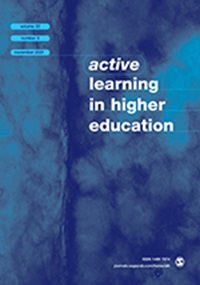‘A sense of community and camaraderie’: Increasing student engagement by supplementing an LMS with a Learning Commons Communication Tool
IF 3.8
1区 教育学
Q1 EDUCATION & EDUCATIONAL RESEARCH
引用次数: 4
Abstract
Whether by choice or pushed online by Covid, higher education is increasingly happening in digital spaces with digital tools forming a critical part of learning and teaching contexts. While reviews suggest such tools positively influence student engagement, research tends to be generic and more is needed to understand how and why specific tools can influence student engagement, learning, and success. Relationships are a key influence on student engagement and online students often feel disconnected and isolated; tools which increase interaction and communication with staff and among students are therefore important. This qualitative study examined how two specific tools, Discord and Teams, work in conjunction with an LMS to benefit student engagement and learning. Nineteen students were interviewed, and the data thematically analysed. Findings show the tools facilitated communication, helped build relationships and communities, encouraged help-seeking within the course and, with Discord, with the wider disciplinary community. These usages led to improved belonging, wellbeing, engagement, and learning. The perceived norms of the digital spaces were an important influence on student tool usage. A key contribution of this research is defining a new tool categorisation, Learning Commons Communication Tools (LCCT), which better describes the informal and organic spaces created by such tools.“社区意识和同志情谊”:通过使用学习共享沟通工具补充LMS,提高学生参与度
无论是自愿还是受新冠肺炎疫情影响,高等教育越来越多地在数字空间进行,数字工具成为学习和教学环境的重要组成部分。虽然评论表明这些工具对学生的参与有积极影响,但研究往往是通用的,需要更多的研究来了解特定工具如何以及为什么会影响学生的参与、学习和成功。人际关系是影响学生参与度的关键因素,在线学生经常感到疏离和孤立;因此,增加与员工和学生之间互动和沟通的工具非常重要。这项定性研究考察了两个特定的工具,Discord和Teams,如何与LMS结合使用,以促进学生的参与和学习。对19名学生进行了访谈,并对数据进行了主题分析。调查结果显示,这些工具促进了沟通,帮助建立了关系和社区,鼓励了课程内的寻求帮助,并与Discord一起促进了更广泛的学科社区的寻求帮助。这些用法提高了归属感、幸福感、参与度和学习能力。数字空间的感知规范对学生使用工具有重要影响。这项研究的一个关键贡献是定义了一种新的工具分类,即学习共享通信工具(LCCT),它更好地描述了由这些工具创建的非正式和有机空间。
本文章由计算机程序翻译,如有差异,请以英文原文为准。
求助全文
约1分钟内获得全文
求助全文
来源期刊

Active Learning in Higher Education
EDUCATION & EDUCATIONAL RESEARCH-
CiteScore
13.20
自引率
12.00%
发文量
31
期刊介绍:
Active Learning in Higher Education is an international, refereed publication for all those who teach and support learning in higher education (HE) and those who undertake or use research into effective learning, teaching and assessment in universities and colleges. The journal is devoted to publishing accounts of research covering all aspects of learning and teaching concerning adults in higher education. Non-discipline specific and non-context/country specific in nature, it comprises accounts of research across all areas of the curriculum; accounts which are relevant to faculty and others involved in learning and teaching in all disciplines, in all countries.
 求助内容:
求助内容: 应助结果提醒方式:
应助结果提醒方式:


